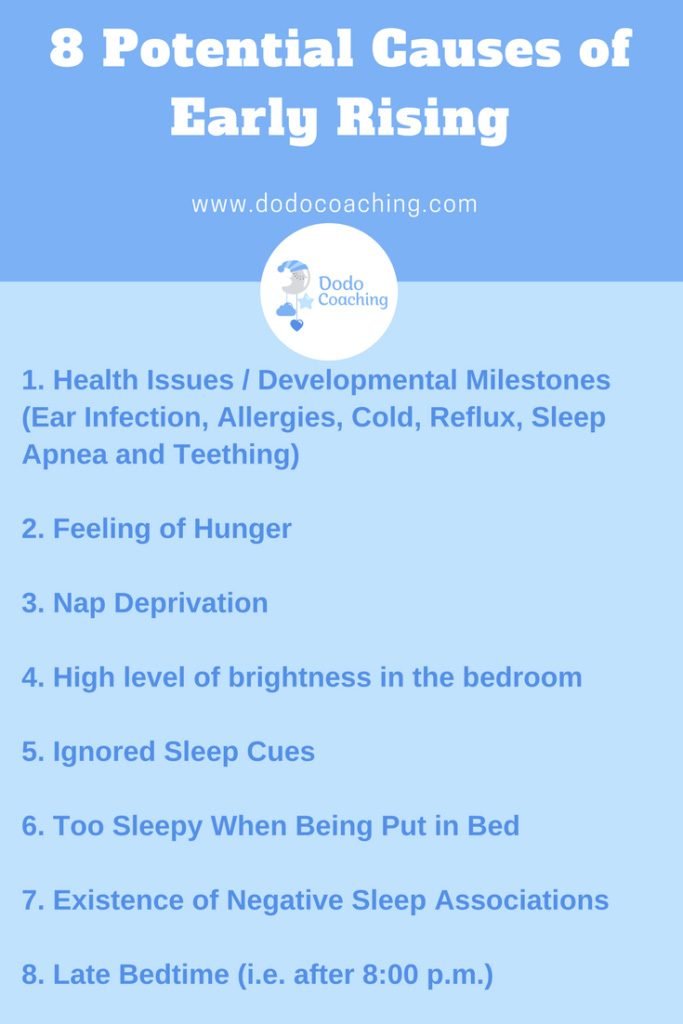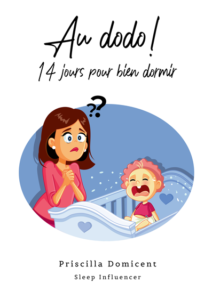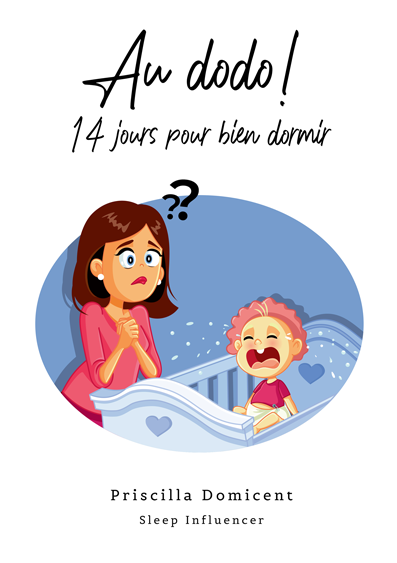Good quality sleep is necessary for everyone, from children to adults. Sleeping helps us function well, physically and mentally. No parent loves to wake up early and listen to the sound of their little one crying. In such a case, you may be likely to think nostalgically about the lazy mornings you enjoyed before your child was born. I know you really want to find a way to delay the wake up time. The good news is that solutions exist but you must be patient and consistent!
What is an early riser?
Early riser, or also called “early bird”, is basically a child who wakes up before 6:00 AM, unable to put himself back to sleep or does not get enough sleep to make it until his nap without being overtired. He will be moaning, crying or yelling to let you know that he needs you in order to fall asleep again. A healthy child, benefitting from enough sleep, should normally wake up between 6:00 AM and 8:00 AM.
Why is your child an early riser?
There are 8 possible reasons why your child wants to start his day before 6:00 AM. Once you know the cause, it is easier to find and apply the right solution.
 1. Health issues
1. Health issues
When a child gets sick, he often wakes up his parents to warn them that he is not feeling well. He expresses his pain and distress, even in the middle of the night. In the particular case of an ear infection, the horizontal position makes it even more painful. Pay attention to your child’s crying (the sound and the intensity) as well as the body temperature. If you have any doubts or have observed possible symptoms, check with your doctor immediately.
In the same way, allergies, reflux and a cold can temporarily disrupt your child’s sleep.
Another common but still underdiagnosed cause is obstructive sleep apnea. About 3% of children suffer from it. To check if your baby is affected by obstructive sleep apnea, answer the following questions:
- Does your child usually snore?
- Is his bed wet from sweating?
- Is he a restless sleeper?
- As a general rule, does your child has an audible noisy breathing?
If the answer is “yes” to each of the above questions, then talk with your pediatrician and ask her to look at your child’s tonsils and adenoids.
If teething does not really fall into the category of health concerns, but instead considered as a developmental stage, it can also greatly disrupt sleep. Teething can definitively interfere with your baby’s sleep, but far less than what you might anticipate or believe. In fact, it is only when your little one shows signs of discomfort, grumpiness and pain during the day that teething can be the sleep-disturbing factor. If he does not complain about unpleasant symptoms related to teething while being awake, take a look at the below-listed reasons causing waking up early. You might find another potential cause that may be at the root of the early-rising issue.
2. Feeling hungry
Your child’s needs change over the first weeks and months. The size of a newborn’s stomach is so small that he could not possibly sleep through the night without being fed. Normal healthy newborns typically need to eat every three hours. As they grow, they can eat larger amounts during the day, which will reduce the number of night feedings.
To make sure that hunger does not cause sleep disruptions, check regularly with your doctor that the frequency of feedings and the amounts eaten during the day correspond to dietary requirements according to its age. If you are breastfeeding, you may want to ask your lactation counselor for some advice.
3. Nap deprivation
When it comes to sleep, one cannot compare the needs of children with adults. As a parent, we tend to think that if a child does not take naps, he will recover during the night the hours he failed to get during the day, and thus sleep longer in the morning. In fact, sleep begets sleep for the Mini Me’s. The more a baby sleeps during the day, the more he will sleep at night. It may sound illogical but it is the simple truth.
If your child does not rest enough during the day or does not have quality sleep (for example, sleeping in a stroller or in a car), getting up very early can be the unpleasant result. So, do not overlook the benefits of siestas.
The table below shows the average sleep recommendations based on the child’s age.
4. High level of brightness in the bedroom
When you enter your child’s bedroom, do you need to turn on the light to avoid bumping into furniture? If this is not the case, the sunlight could be your child’s alarm clock. His thin eyelids do not block the daylight on which its circadian rhythm (or internal clock) strongly depends. In fact, as of the second month of his life, a child distinguishes day from night thanks to daylight which is considered as a natural indicator. By seeing the sunlight, your child thinks it is time to wake up.
To overcome this problem, consider installing blinds or blackout curtains. They will prevent natural light from entering the room during naps and early morning. These accessories are not only a nice piece of decoration but also regulate the darkness of the bedroom, and therefore the quality of sleep. The ideal level of darkness should not allow you to see your hand when you stretch out your arm.
Also avoid letting your baby sleep in a stroller or in the car because he does not benefit from a deep sleep in such circumstances because of the annoying level of light.
5. Ignored sleep cues
An exhausted child usually needs more time to fall asleep and wakes up more frequently during the night. If you miss your child’s sleep window, i.e. his natural time to sleep, his little body won’t be pumping out calming melatonin. On the contrary, the stress-related hormone (cortisol) will restimulate him. He will regain energy as if he had drunk a double espresso. He will become more agitated and be more difficult to calm down. A little one who is lacking sleep is also more prone to have nightmares.
The signs of tiredness parents should look for are the following:
- eye rubbing
- yawning
- slowed activity
- listlessness
- limpness
- clumsy movements
- decreasing verbal expression
- weaker or slower suction
- thumb sucking
- caressing a blanket, lovey or a part of a parent’s body
- playing with a parent’s hair
- zoning or staring blankly into space
- whining and fussing
- loss of interest in people and toys
If you see one or more of these above-mentioned behaviors, your child probably reached that critical point of tiredness. Without further ado, he should be put to bed as soon as possible. This is true for naps as well as for bedtime.
In addition, to make sure your little one is not overtired at night, there can be no more than 4 to 5 hours between the end of his nap and the beginning of his night. Since each child is unique, there is no universal schedule applicable. In order to create one based on your child’s natural rhythm, keep a log for a week or two. Write down when you see signs of fatigue and at what time he went to bed and fell asleep. This way, you will follow a customized schedule and will make sure that he will not be too exhausted or already asleep when going to bed.
6. Too sleepy when being put in bed
Just like talking and walking, finding sleep is a skill that is taught and learned. As from the eighth week, a baby’s night sleep falls into place. The perfect time has then arrived to teach him how to fall asleep on his own. After the second month, you should try to put your child in bed drowsy but awake at least once a day. “Drowsy but awake” means that he knows who is putting him in bed and where he is before falling asleep. This way, he will not panic when waking up and wonder how on earth he ended up there.
The best time of the day to initiate the sleep coaching is the morning nap. If he has fallen asleep during the nap routine, wake him gently before putting in the bed. If he does not like this learning attempt, take him again in your arms and comfort him. Try the experience once a day, day after day. Once he has mastered the morning nap, put him also down drowsy but awake before the afternoon nap and at bedtime. This technique will teach him that he does not need your presence to fall asleep, even when waking up in the middle of the night.
7. Existence of negative sleep associations
The concept of “sleep association” regroups all behaviors that help a baby to fall asleep. Children of all ages, and even adults, have sleep associations, whether they are aware of it or not.
Negative sleep associations usually involve a parent who does one or more of the following to help the child to fall asleep :
- breastfeeding or bottle-feeding
- rocking or walking with the child
- swinging
- singing
- rubbing the child’s back
- sleeping next to the child’s bed
- holding the child’s hand or finger
- driving a car or pushing the stroller
- bringing the child in the parental bed
If your child has not learned to fall asleep on his own, he will most likely not be able to go back to sleep at night without your help. Your goal will be to replace negative sleep associations with positive ones.
Positive sleep associations usually involve the baby doing one or more of the following actions, without the intervention of an adult:
- biting, rubbing or holding a blanket or a lovey
- sucking one or more fingers
- sucking a pacifier
- hitting the feet against the mattress
- banging the head against the crib’s bars
- swinging back and forth
- making small vocal sounds
- using a white noise machine or a fan
8. Late bedtime
The ideal bedtime is scheduled between 6:00 PM and 8:00 PM. Prior to this time interval, you may experience an early morning wake up call the next day since children normally sleep 11 to 12 hours at night. If you keep your little angel up after 8:00 PM, you take the risk of getting him exhausted. He would be then too excited to fall asleep.
As mentioned earlier, pay attention to the signs of fatigue to determine when to put your child to bed. Parents often justify a late bedtime because one or both parents come home late at night and want to spend quality time. In this case, I advise to rather enjoy the mornings together, before they leave for work. Providing the child with adequate sleep should be the family’s priority. Teaching kids healthy sleep habits will benefit them greatly. It is proven that a well-rested child has a better ability to stay focused, develops well, is less irritable, strengthens his immune system, manages his emotions better and has greater capabilities to learn.
Is it possible that my child is a natural early riser?
Some parents have told me that they need few hours of sleep and think that their offspring is identical. However, every child, without an exception, needs a lot of rest to develop well.
In case your child gets up regularly before 6:00 AM, review the list of factors causing early morning wakenings and identify the reason(s) why he might get up at the crack of dawn.
Be aware that if you modify your child’s routine to delay the wake up time, the early risings will not suddenly become a vague memory. The adjustment process to delay the morning wakenings can take weeks. Luckily, the vast majority of parents who are patient and consistent achieve their goal.
If you would like to get more information on how to improve the quality and/or the quantity of your child’s sleep (and yours at the same time), do not hesitate to schedule a 15-minute preliminary consultation. It is a totally FREE & NON-BINDING offer!










